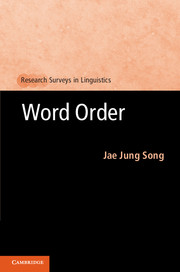Book contents
6 - The performance-based approach
Efficiency in processing (and production)
Published online by Cambridge University Press: 05 June 2012
Summary
There is an enormous amount of research carried out on language processing (and, to a lesser extent, on production), that is, in terms of how humans process (or produce) language in real time. Within linguistics, interest in processing and production – which goes back to the early 1970s (e.g. Bever 1970; Kimball 1973) – has been most prominently pursued, not surprisingly, by psycholinguists. This kind of research endeavour is not in the least confined to (psycho)linguistics, however. Indeed language processing and production have long been an active research area within computational linguistics (CL) and natural language processing (NLP) as well. The sheer volume of processing/production research in these disciplines makes it presumptuous to consider offering an overview, let alone a survey, of the relevant literatures. The present book is definitely not a place for such an overview or survey, not to mention that an attempt to provide one is well outside its scope. (Readers interested in such a survey in psycholinguistics, CL or NLP are advised to look elsewhere, e.g. Mitkov 2003; Gaskell 2007; Clark, Fox and Lappin 2010; Indurkhya and Damerau 2010.)
There is another important reason why the psycholinguistic, CL and NLP approaches to processing and production will not be included for discussion in this book: they all have different research foci. For instance, what psycholinguistics “has focussed, since its inception, on” is ambiguity resolution (Hawkins 2004: 246), that is, so-called attachment ambiguities, often embedded in rather unusual contexts – strings of words that human parsers may process in more than one way (e.g. garden-path effect, as exemplified by The horse raced past the barn fell or The scientist examined by the lawyer turned out to be an unreliable witness) – as well as on how ambiguity resolution may delay the human parser’s comprehension (Gibson and Pearlmutter 1994; MacDonald, Pearlmutter and Seidenberg 1994; Spivey-Knowlton and Sedivy 1995; Brannigan, Pickering and McBean 2005, inter alios; also van Gompel and Pickering 2007 for an overview). However, as Wasow (2002: 88–108; also Hawkins 2000: 254–5, 2004: 246) has demonstrated with corpus and experimental evidence, ambiguity resolution or avoidance is “at best a minor influence” on word/constituent ordering; speakers do not seem to linearize words and constituents so as to avoid ambiguity – that is, context, prosody, and so on, can easily help disambiguate utterances (e.g. MacDonald, Pearlmutter and Seidenberg 1994; Spivey-Knowlton and Sedivy 1995; Tanenhaus et al. 1995). More to the point, ambiguity resolution research in psycholinguistics has not been conducted with regard to its effect on word/constituent ordering (Wasow 2002: 88).
Information
- Type
- Chapter
- Information
- Word Order , pp. 234 - 303Publisher: Cambridge University PressPrint publication year: 2012
